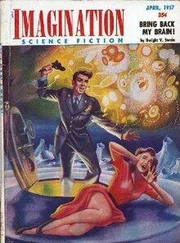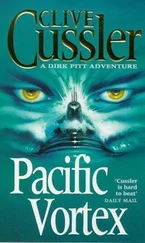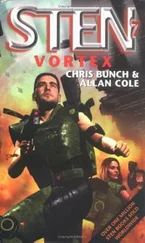Taylor put it on and heard, “Good morning, gentlemen. Lieutenant Colonel
Haigler, U.S. Marine Corps, at your service.”
Sure that lieutenant colonels did not normally pilot helicopters, Taylor replied, “Good morning, Colonel.”
Taylor, who still thought of himself as a major, fought the urge to call
Haigler “sit.” His commissions as commandant, colonel, and finally brigadier had been earned in combat, in response to the new province’s desperate need for an organized military force. His deputy, Adriaan
Spier, had been a lieutenant and was now a colonel.
“How far is it to your flotilla, Colonel?” asked Fraser.
The American officer’s slow, confident voice filled his earphones.
“About sixty miles-nautical miles. ETA over the task force is in roughly forty minutes.”
Taylor looked back. The dark coast behind them was invisible, and the
Nighthawk skimmed over the dark waves only twenty meters below them.
There were no marks to navigate by, and only fading starlight to see by.
He trusted the pilot’s navigational skills, though. He had to.
After about thirty minutes, the helicopter started climbing. The eastern horizon was already visibly lighter, and the three South Africans heard
Haigler say, “I thought you’d like to have a look before we set down.”
Taylor and his two companions peered out the port windows. They were climbing steadily. His ears popped uncomfortably, and he kept yawning, trying to clear them. Now he knew why so many American fliers seemed to chew gum all the time.
The sun was also climbing to meet them, casting its pale early-morning light farther and farther to the west. Suddenly, what had been a dark and empty seascape was full of gray painted ships.
Taylor was sure they were in some sort of formation, but all he could see was a mass of ships-some small, many large. He picked out what had to be a carrier, and as if to
reinforce the point, two F-14 fighters flew past the helicopter, close enough for a good look but just far enough away to avoid buffeting their craft.
The brigadier began to smell a setup. No doubt the Americans and their
British allies thought an initial display might influence the attitudes of their South African guests. Still, he appreciated the show. If nothing else, Taylor now had a much better idea of the task force’s size and fighting power.
The Nighthawk angled down, and Taylor realized they were not heading for the carrier, but for what had to be a battleship. He had heard and read of these vessels, but he had never seen one, certainly not like this. The warship seemed to symbolize the American intervention. It was massive, powerful, even pretty to look at. He was genuinely impressed.
In a long, slow, smooth arc, the helicopter came in to land on the battleship’s fantail. As soon as it touched down, two lines of Marines ran up, dressed in camouflaged battle dress but still looking crisp and neat despite that.
Fraser stepped out first, followed by Taylor and then Spier. Boatswains’ pipes shrilled, and they stopped momentarily as the Marines lined up to either side presented arms. Taylor and the others were escorted over to a group of officers drawn up on the fantail.
He consciously squared his shoulders. The ceremonies were almost over.
Now they’d get down to work.
Lt. Gen. Jerry Craig eyed the approaching South Africans carefully. They were potential allies, but that alliance was far from automatic. His mind sorted out names, faces, and first impressions while his ears listened to the routine introductions-the Wisconsin’s captain, the commander of the Marines Expeditionary Force, and so on.
He liked what he saw of Taylor. The South African commander was a weathered-looking man, a little younger than Craig, weary, with that same thousand-mile stare he’d seen in Vietnam-the look of a man who’d seen too much combat. Spier was similar, but more enthusiastic. It was clear the mande of responsibility was a heavy burden for the young brigadier.
Fraser was a different sort. Smooth, self-assured, he looked as if he hadn’t missed many meals-despite the shortages Craig had heard about.
Although Fraser was a South African, the general thought he could have stepped out of any city hall or state house in the States. He hated the politician instantly.
Well, it was time to start the festivities, Craig thought. As senior officer he was master of ceremonies.
“Will you gentlemen accompany us to the wardroom? We thought you might like some breakfast before we get down to business.”
Although billed as a training exercise, the gunnery drill was really a demonstration of the battleship’s firepower. An ample, “American-style” breakfast had been followed by a quick tour of the Wisconsin, capped off by this “exercise” firing. Taylor didn’t need the demonstration, but he was happy to watch. He’d be too busy when the Wisconsin actually fired her guns in anger.
The Wisconsin was the centerpiece of Taylor’s plan for clearing Table
Mountain-the answer to his prayers. Air attacks had proved futile against the recessed, heavily armored gun positions. The battleship’s one-ton shells were both precise and powerful enough to knock out the guns. In addition, sixteen-inch shells were cheap, and the Wisconsin could pound the battery again and again, until it was gone.
Craig and Capt. Thomas Malloy, the Wisconsin’s skipper, were having an animated discussion about gun safety and backblast, and Taylor sagged against the railing and tried to rest. His morning on the battleship had been his first day of relative peace since the civil war started.
He looked up as Craig nodded to his guests.
“Gentlemen, I recommend that we remain inside the bridge during the firing. “
Taylor was reluctant to leave the bridge wing’s fresh air and wider view, but he sensed that Craig knew his business.
As soon as they stepped inside the bridge, sailors rushed forward to swing the armored doors shut, dogging them tightly. During their brief tour, Taylor had noticed the heavy steel forming both the doors and the bulkheads they were set
in. With its six inches of all-around steel protection and splinter-proof glass windows, Malloy referred to the bridge as part of his ship’s armored “citadel,” a term that seemed highly appropriate.
Responding to Malloy’s orders, the Wisconsin changed course. As the ship turned, Taylor saw its massive forward gun turrets start moving. A ringing alarm bell warned anyone foolish enough to be on deck to keep clear of the moving machinery.
Each turret swung out to starboard, pointing harmlessly out to sea. Craig explained that an artificial target was being fed into gunnery plot, many decks below, and that the guns would fire a salvo at this imaginary enemy.
Muzzles whined upward on the two forward turrets.
Taylor heard a “Stand by!” from the phone talker, followed by a shrill beep-beep, and the second beep ignited an explosion that filled his world with sound.
Smoke and flame splashed off the armored glass windows in front of him, and his feet carried the firing shock up his legs and spine until it shook inside his head. Nine sixteen inch shells, each weighing one ton, howled twenty miles downrange. Each shell was twenty times larger than those fired by the guns on Table Mountain. For a brief instant, the whole battleship seemed to stagger and rock back under the force of its broadside.
The bridge windows cleared as the Wisconsin’s motion carried it out of the smoke cloud. Mist still streamed from the gun tubes. In the silence following the explosion, Taylor turned to the Marine general and nodded firmly.
“That should do the job, I would think “
WARDROOM, USS VWSCONSIN
Lt. Gen. Jerry Craig wanted to rub his eyes, get up and walk around, and take a breath of fresh air. He wanted to leave, to get back to his command center where the only problems he faced involved killing an armed and alert enemy.
Читать дальше












